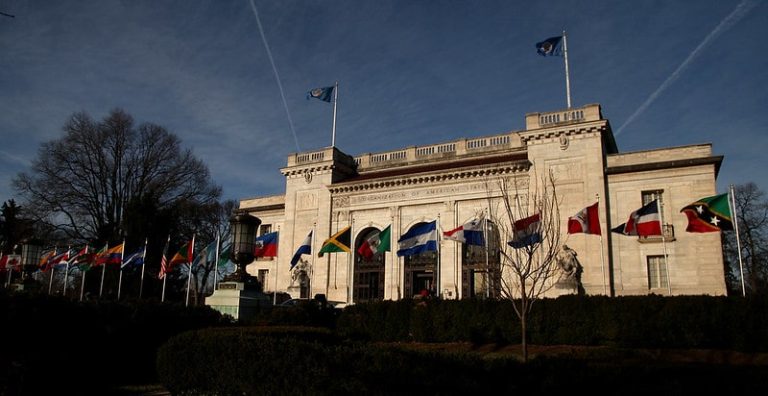19 de noviembre 2021

Children of Exile: The Births “Sowing Hope” in the Camp of Nicaraguan Farmers

PUBLICIDAD 1M
PUBLICIDAD 4D
PUBLICIDAD 5D
The Assembly will approve a resolution of condemnation against the OAS, which will be replicated by the Judicial, Electoral and Executive Powers

The Ortega regime is preparing its “response” to a resolution of the Organization of American States (OAS), which declared the votes that took place on November 7 “illegitimate”. The regime will use all the powers of the State, according to the Ortega deputy Gustavo Porras, president of the National Assembly.
The Legislative Branch, which is controlled by pro-Ortega and collaborationist deputies, is the one that will stand out in this joint strategy through a plenary session to be held this Tuesday, in which they will approve a resolution condemning the response of the foreign ministers gathered at the last OAS General Assembly to the process without political competence and under a climate of repression promoted by Ortega's government.
Porras announced that this same resolution will be replicated by the Electoral, Executive and Judicial Branches, all of which are subordinated to Orteguismo.
“The objective of this plenary session is to reject all these interfering actions that violate the sovereignty and self-determination of Nicaragua, by that discredited organization that is the OAS”, said Porras to a crowd of journalists that propagandize the regime.
On November 12, Daniel Ortega's regime suffered a political defeat at the OAS General Assembly of Foreign Ministers, when 25 countries approved a resolution that declared that the votes with which the Sandinista caudillo was reelected for the third consecutive time were “without democratic legitimacy”. The elections were held without political competition and without democratic guarantees.
“We are also going to request that the rest of the powers of the State continue demonstrating to prevent the continuation of this interfering attitude from this organization (...) we also want to reach a consensus to urge the President of the Republic to denounce the (Inter-American Democratic) Charter of the OAS”, added Porras.
The OAS foreign ministers set November 30 as the deadline for the Permanent Council to make a “collective assessment” of the situation in the country, “in accordance with the OAS Charter and the Inter-American Democratic Charter”, and to “take the appropriate actions”, which would lead the Ortega regime to face a possible suspension from the organization.
Although Porras did not mention anything about Nicaragua’s potential withdrawal from the regional organization, propagandists of the dictatorship on social networks have echoed the statement from the Ortega deputy as a sort of beginning of a process of the country's exit as an active member of the OAS.
The resolution in the General Assembly was presented by the delegations of eight countries: Canada, Antigua and Barbuda, Chile, Costa Rica, Ecuador, United States, Dominican Republic and Uruguay. The only vote against was that of Nicaragua, seven countries abstained and one declared itself absent.
According to the voting record, noted by CONFIDENCIAL during the broadcast, Mexico, Honduras, Belize, Bolivia, Dominica, St. Vincent and Grenadines and St. Lucia abstained, while the country that was “absent” was Kitts and Nevis.
Ortega himself has criticized the OAS in several speeches for its role in condemning the climate of political violence and repression in Nicaragua, even calling it “a sewer”.
“We are still members, and we should stop being members of that sewer once and for all. It is clear that this is an instrument of domination of the Yankee empire,” Ortega said during a speech on June 24.
According to the OAS charter, the procedure for a country to voluntarily leave the organization as an active member takes two years, during which time the country will maintain its obligations and responsibilities as any other full member of the organization. In addition, Nicaragua would also have to pay any outstanding payments owed to the organization.
The only case of an exit from the OAS in its history has been that of Venezuela, under the dictatorship of Nicolás Maduro, one of Ortega's main allies. The representation of that country has been exercised by an official of Juan Guaidó, whom most members of the organization recognize as the legal president of Venezuela.
This article was originally published in Spanish in Confidencial and translated by our staff
PUBLICIDAD 3M
Confidencial es un diario digital nicaragüense, de formato multimedia, fundado por Carlos F. Chamorro en junio de 1996. Inició como un semanario impreso y hoy es un medio de referencia regional con información, análisis, entrevistas, perfiles, reportajes e investigaciones sobre Nicaragua, informando desde el exilio por la persecución política de la dictadura de Daniel Ortega y Rosario Murillo.
PUBLICIDAD 3D